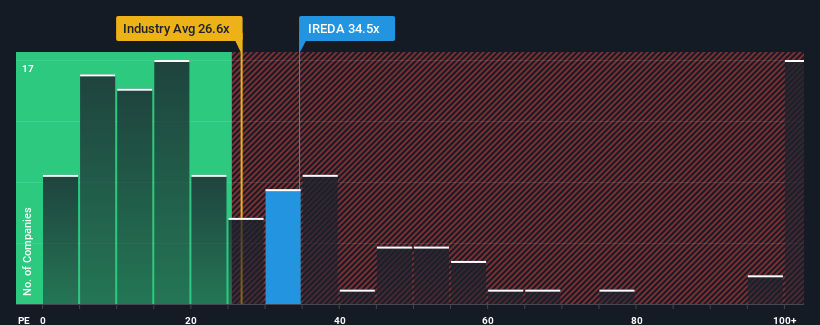- India
- /
- Diversified Financial
- /
- NSEI:IREDA
Unpleasant Surprises Could Be In Store For Indian Renewable Energy Development Agency Limited's (NSE:IREDA) Shares

With a price-to-earnings (or "P/E") ratio of 34.5x Indian Renewable Energy Development Agency Limited (NSE:IREDA) may be sending bearish signals at the moment, given that almost half of all companies in India have P/E ratios under 31x and even P/E's lower than 17x are not unusual. However, the P/E might be high for a reason and it requires further investigation to determine if it's justified.
Indian Renewable Energy Development Agency has been doing a good job lately as it's been growing earnings at a solid pace. One possibility is that the P/E is high because investors think this respectable earnings growth will be enough to outperform the broader market in the near future. You'd really hope so, otherwise you're paying a pretty hefty price for no particular reason.
Check out our latest analysis for Indian Renewable Energy Development Agency

Does Growth Match The High P/E?
In order to justify its P/E ratio, Indian Renewable Energy Development Agency would need to produce impressive growth in excess of the market.
If we review the last year of earnings growth, the company posted a terrific increase of 15%. Still, incredibly EPS has fallen 1.5% in total from three years ago, which is quite disappointing. Accordingly, shareholders would have felt downbeat about the medium-term rates of earnings growth.
In contrast to the company, the rest of the market is expected to grow by 25% over the next year, which really puts the company's recent medium-term earnings decline into perspective.
With this information, we find it concerning that Indian Renewable Energy Development Agency is trading at a P/E higher than the market. Apparently many investors in the company are way more bullish than recent times would indicate and aren't willing to let go of their stock at any price. Only the boldest would assume these prices are sustainable as a continuation of recent earnings trends is likely to weigh heavily on the share price eventually.
The Key Takeaway
Typically, we'd caution against reading too much into price-to-earnings ratios when settling on investment decisions, though it can reveal plenty about what other market participants think about the company.
We've established that Indian Renewable Energy Development Agency currently trades on a much higher than expected P/E since its recent earnings have been in decline over the medium-term. Right now we are increasingly uncomfortable with the high P/E as this earnings performance is highly unlikely to support such positive sentiment for long. If recent medium-term earnings trends continue, it will place shareholders' investments at significant risk and potential investors in danger of paying an excessive premium.
We don't want to rain on the parade too much, but we did also find 2 warning signs for Indian Renewable Energy Development Agency that you need to be mindful of.
Of course, you might find a fantastic investment by looking at a few good candidates. So take a peek at this free list of companies with a strong growth track record, trading on a low P/E.
New: AI Stock Screener & Alerts
Our new AI Stock Screener scans the market every day to uncover opportunities.
• Dividend Powerhouses (3%+ Yield)
• Undervalued Small Caps with Insider Buying
• High growth Tech and AI Companies
Or build your own from over 50 metrics.
Have feedback on this article? Concerned about the content? Get in touch with us directly. Alternatively, email editorial-team (at) simplywallst.com.
This article by Simply Wall St is general in nature. We provide commentary based on historical data and analyst forecasts only using an unbiased methodology and our articles are not intended to be financial advice. It does not constitute a recommendation to buy or sell any stock, and does not take account of your objectives, or your financial situation. We aim to bring you long-term focused analysis driven by fundamental data. Note that our analysis may not factor in the latest price-sensitive company announcements or qualitative material. Simply Wall St has no position in any stocks mentioned.
About NSEI:IREDA
Indian Renewable Energy Development Agency
A non-banking financial company, provides financial products and services in the renewable energy and energy efficiency sectors in India.
Solid track record with mediocre balance sheet.
Similar Companies
Market Insights
Community Narratives




